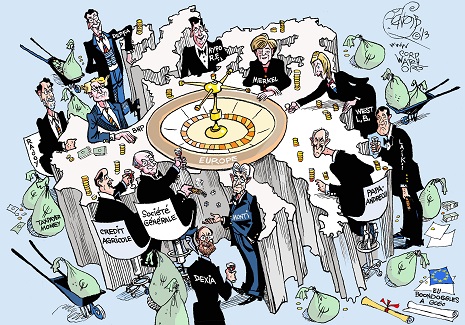Greece, crushed by the budget austerity demanded by its European partners in order to obtain bailout funds, had barely started to recover from five years of recession. The Finnish economy has been hurt in part by the decline in trade with Russia after the Western-imposed sanctions against President Vladimir V. Putin’s government over the crisis in Ukraine.
Over all, the gross domestic product of the 19 nations that form the euro currency bloc grew 0.4 percent in the period from January to March from the previous three months, when it grew 0.3 percent, Eurostat, the statistical agency of the European Union, reported from Luxembourg.
The European Union, with 500 million consumers, is the world’s biggest mature market and its biggest exporter. Better growth in the region would help to keep the global economy expanding as worries arise about a slowdown in China and the United States.
The bloc’s economy has been expanding since the first half of 2013. Economists credit the happy combination of a weak euro, low oil prices and the European Central Bank’s effort to drive down interest rates with aggressive monetary policy for keeping the expansion alive.
Eurostat said the eurozone’s first-quarter growth worked out to an annualized rate of 1.6 percent, sharply higher than the 0.2 percent annual growth the United States produced in the same period.
The German economy grew 0.3 percent at a quarterly pace, slowing from a 0.7 percent rate in the last three months of last year and slightly disappointing market expectations of a 0.5 percent increase. The biggest surprise came from France, where first-quarter growth of 0.6 percent was the strongest in nearly two years and well ahead of expectations of 0.4 percent after stagnating in the final quarter of 2014.
Christian Schulz, an economist at Berenberg Bank in London, pointed out in a research note that cheaper gasoline had helped French consumers raise their spending by a strong 0.8 percent from the previous quarter, while inventory buildup, a notorious contributor to data volatility, also helped the quarterly showing.
Some of the positive factors that lifted first-quarter growth will probably not be repeated. Oil prices were about 30 percent lower in the first quarter than in the final quarter of 2014, providing a stimulus to consumers, but have since rallied.
The euro was almost 10 percent weaker in the first quarter than in the previous three months, a boon to European exporters. But the currency appears to have stabilized around its current level of $1.12. And the European Central Bank’s quantitative easing policy, under which it buys up to 60 billion euros, or $67 billion, of bonds each month to stave off deflationary pressures, is now built into expectations.
Europe has not fully recovered from the global financial crisis and the sovereign debt turmoil that followed it. Joblessness in the eurozone, at more than 11 percent, continues to hobble demand, and the gap between potential and actual output is so great that inflationary pressures are nonexistent.
“Strengthening the European economic recovery requires further decisive policy efforts,” Valdis Dombrovskis, the European Commission’s vice president with responsibility for the euro, said at a news conference in Brussels. “Many member states face challenges such as high public and private debt, low productivity and lack of investment, which result in high unemployment and worsening social conditions.”
The European Commission said on Wednesday that Finland faced possible disciplinary action after it failed to hold its budget deficit below the 3 percent ceiling under European Union rules. A so-called excessive deficit procedure, if the commission were to open one, would put Finland in the same camp as Spain, France and Greece, countries that the pro-austerity Finns have been known to criticize for their fiscal laxity.
In Spain, one of the eurozone countries hit hardest since the financial crisis, the economy regained more lost ground, posting first-quarter quarterly growth of 0.9 percent. Italy grew at a 0.3 percent quarterly rate, the first expansion recorded in the country since the third quarter of 2013, when the economy grew 0.1 percent.
The picture in Britain, which is not a member of the euro currency group, was similar to that of the eurozone. The Office for National Statistics reported in late April that the British economy grew at a quarterly rate of 0.3 percent in the January-to-March period, disappointing market expectations. On Wednesday, the Bank of England cut its 2015 growth forecast to 2.5 percent from 2.9 percent after that worse-than-expected performance.
More about:


























-1745485667.jpg&h=190&w=280&zc=1&q=100)





















